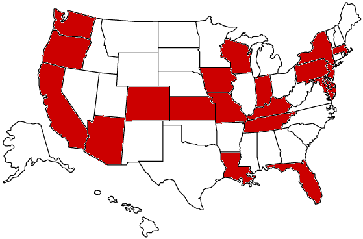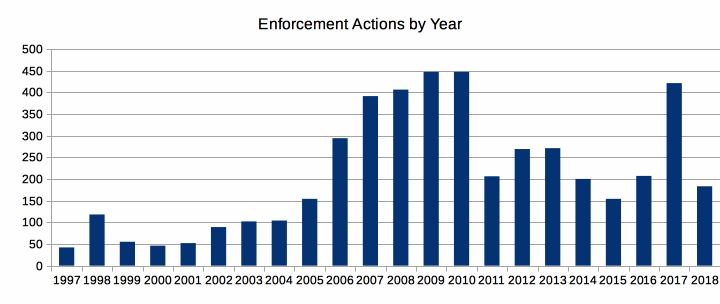After plummeting in 2011, FCC enforcement against unlicensed broadcasting rebounded ever so slightly last year – but not in any meaningful fashion.
 About 100 pirate radio stations in 19 states had contact with the federales in 2012, resulting in 245 specific enforcement actions. Interestingly, the vast majority of these happened in the first half of the year; for some reason, enforcement activity took a nosedive in July and never recovered. Continue reading “FCC Enforcement in 2012: Going Nowhere Fast”
About 100 pirate radio stations in 19 states had contact with the federales in 2012, resulting in 245 specific enforcement actions. Interestingly, the vast majority of these happened in the first half of the year; for some reason, enforcement activity took a nosedive in July and never recovered. Continue reading “FCC Enforcement in 2012: Going Nowhere Fast”
Tag: enforcement
Larry Bloch: 1953-2012
Larry Bloch, a founding member of radio free brattleboro, died last month of pancreatic cancer. He was 59.
Bloch was one of those rare and lucky folks for whom activism was a full-time vocation. After working with Greenpeace throughout the 1980s, he created the Wetlands Preserve in New York City in 1989. The nightclub became a magnet for many bands that rose to fame out of the “alternative” music soup of the 1990s. Continue reading “Larry Bloch: 1953-2012”
FCC Goes Gangbusters on Jammers
On the heels of admonishing a half-dozen people for hawking cell-phone and GPS jammers on Craigslist earlier this month, the FCC unveiled a new web portal and toll-free hotline for reporting the use of such devices. In doing so it cited another six people for their online sales shenanigans.
Within these documents (sample), the FCC details its planned strategy for enforcement in this domain:
While we previously have issued warnings to operators in the first instance -primarily because non-monetary penalties historically have proven effective in deterring unlawful operation by individuals – we are not required to do so. We are mindful of the serious risks posed by jamming devices and the apparent need to provide greater incentives…to cease the operation, importation, and sale of jamming devices altogether. Therefore, we caution you and other potential violators that going forward, and as circumstances warrant, we intend to impose substantial monetary penalties, rather than (or in addition to) warnings, on individuals who operate a jammer. Continue reading “FCC Goes Gangbusters on Jammers”
FCC Agents Expand Online Prowling
It’s already well-established that FCC field enforcement agents use the internet to collect information for busting pirate radio stations – visiting station web sites, Facebook pages, and the like looking for information to beef up their cases.
FCC agents have also gone after the sellers of non-certified AM and FM transmitters, illegal CB amplifiers, and signal jamming devices. In the past, this has included scouring eBay looking for scofflaws.
This week the Enforcement Bureau broke new cyber-ground by issuing two citations against people for advertising cell phone jamming devices on Craigslist. Continue reading “FCC Agents Expand Online Prowling”
FCC Enforcement: Questionably Redundant and Retributive
Two-thirds of 2012 is in the can, and the FCC seems to be adhering to its “new normal” when it comes to pirate radio enforcement. Field agents have conducted 183 enforcement actions as of the end of August – this is up from the 132 actions logged by this time a year ago, but well off the year-over-year record-breaking enforcement pace set between 2006 and 2010.
The FCC’s been involved in anti-pirate enforcement activity in 15 states and Puerto Rico so far this year, as opposed to more than two dozen states by this point in 2011. The hottest spots continue to be the New York metropolitan area as well as the state of Florida more generally. Continue reading “FCC Enforcement: Questionably Redundant and Retributive”
FCC Enforcement: Check, Please!
It’s been an active spring for field agents in the FCC’s Enforcement Bureau, but the agency’s pirate-hunting fervor still seems tempered. The present pace of this year’s activity mirrors 2011 – good news of a sort, because last year saw a massive drop-off in enforcement action.
That said, about four dozen pirate stations in 13 states (and Puerto Rico) have had some sort of contact with the federales this year. Although the FCC’s enforcement protocol remains firmly in the administrative realm, there have been some interesting developments this year. Continue reading “FCC Enforcement: Check, Please!”
FCC Budget: Enforcement Bureau to Get Some New Gear
The Federal Communications Commission has tendered its budget request to Congress for fiscal year 2013. It’s asking for $346.8 million – a $7 million increase from FY 2012. The trades have highlighted the agency’s request for $2.5 million to replace and upgrade “direction finding and wireless monitoring equipment,” of which $1.1 million will be spent on eight custom field enforcement vehicles.
The Clear Channel-owned publication Inside Radio dubbed this an investment in “pirate-fighting funds.” Such sentiments have no basis in fact. Continue reading “FCC Budget: Enforcement Bureau to Get Some New Gear”
Anti-Pirate Enforcement Plummets in 2011
The austerity gripping the United States caught up with the FCC’s Enforcement Bureau last year, as field activity against unlicensed broadcasters dropped dramatically – to a level not seen in six years.
 From a record high of 447 enforcement actions clocked in 2009 and 2010, field agents executed just 184 in 2011, against fewer than 100 stations total. Massive drops were seen in the number of station-visits and warning letters issued. Continue reading “Anti-Pirate Enforcement Plummets in 2011”
From a record high of 447 enforcement actions clocked in 2009 and 2010, field agents executed just 184 in 2011, against fewer than 100 stations total. Massive drops were seen in the number of station-visits and warning letters issued. Continue reading “Anti-Pirate Enforcement Plummets in 2011”
Monkey's Last Stand
There seems to be some controversy over the FCC’s move to fine Pirate Cat Radio founder Daniel “Monkey Man” Roberts. The forfeiture notice, issued last month, details the FCC’s investigation of the station since 2009 and cites the significant amount of leg-work done in the case.
Roberts has engaged the services of an attorney, who is arguing that since the FCC has no evidence of him actually operating the transmitter, there’s no credible grounds for a forfeiture. The agency disagrees, noting Roberts’ extensive work as Pirate Cat station manager, fundraiser, DJ, and all-around public face, as well as his prior (and dubious) claim that unlicensed broadcasting is exempt from licensure under certain extenuating circumstances. Continue reading “Monkey's Last Stand”
Justice Takes A While
Exactly six months ago, I filed a complaint with the FCC regarding Madison right-wing radio harpy Vicki McKenna’s violation of broadcast law by playing a recorded phone call without the permission of the caller. Since then, McKenna’s employer, the Clear Channel-owned WIBA-AM, pulled McKenna’s podcasts from the station web site and McKenna claimed that she and her employer were being unjustly persecuted. (Her podcasts have been restored during the last month – including the show that landed her in hot water in the first place.)
Nothing could be further from the truth: the more speech the better, but use of the public airwaves comes with some responsibilities. So I called the FCC’s consumer help-line to inquire about the status of my “case.” Continue reading “Justice Takes A While”